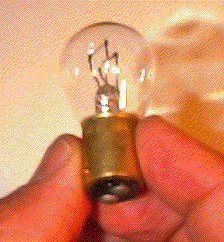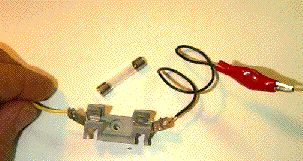
Figure C4
Bulb

Use your meter (set to K) to figure out what contacts are needed for
the thicker, lower-resistance filament. Hint: The thicker filament has such
low resistance that the meter may indicate zero ohms resistance. However,
both the resistance of the thinner filament and the total resistance can
be measured. One pair of connections forces current through both filaments
and measures as higher resistance than any other. From measurements of the
thin filament and the total resistance, you can deduce the resistance of
the thicker filament. What are these resistances?
12 Volt Transformer
What is the voltage and maximum current the transformer can produce? Do
you know what DC means? The maximum power it can deliver is the product
of the voltage and maximum current. What is the maximum power this transformer
can produce? Keep this in mind, because it will overheat and melt if you
go above this. The wall transformer is important for safety. Do not ever
experiment with power coming from a wall socket. It is at 110 V and can
kill. The transformer lowers the voltage to 12 V which is safe. While there
is no way the 12 V will hurt you, you can kill the transformer if you are
not careful. Don't let the two wires coming from the transformer touch.
There must be no direct path from one wire to the other. The current must
go through some load: a lamp, the fan, or something that limits the flow
of electrical current. With too much current, the transformer will heat
up and melt or blow out the circuit inside the transformer. Important hint:
Always unplug the transformer until you are ready to experiment. Before
you plug it in, check you wiring. Make sure every path from one wire to
the other has a load. Whenever you finish an experiment, unplug the transformer.
One way to protect the transformer is to add a fuse. If your transformer
has no fuse, solder a fuse block onto one of the wires coming out of the
transformer. Have your TEACHER INSPECT this wiring before you plug in the
transformer.

Prepare your transformer. If it does not already have clip leads and
a fuse, you will need to install them. Unplug the transformer . If it has
a 12 volt plug, cut off this plug near its end of the wire and separate
the wires for about 10 cm. Cut one wire5 cm shorter than the other. Strip
about 1 cm of the insulation off the wires and twist thier ends. Solder
the fuse holder to the wire you cut short. Tin the bare wires with solder,
and add the clip leads. Connect the transformer with clip leads to your
meter. Plug it in and measure the voltage. Try using the transformer to
light the tail-light bulb and to run the fan you will find in your box of
parts.
Heater Chimney
Make a rectangular tube of cardboard 6 cm long. The outside dimensions (of
the cross section) should be 4 cm by about 7.5 cm, so it will fit inside
the incubator box. The flap should glue on the inside to insure a good fit
in the incubator.
The bulb will be inside this heater chimney. Make a bulb socket by wrapping
wire galvanized iron wire around the bulb 6 or 8 times. Bring the ends of
this spiral of wire through the sides of the chimney, bend them over, and
glue them down. The bulb should be centered and must not touch the sides.